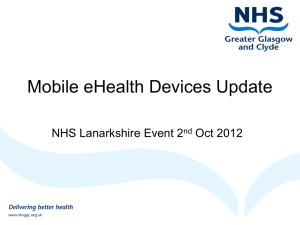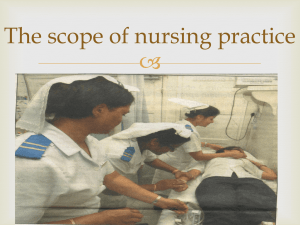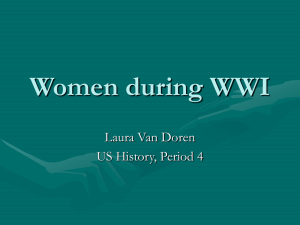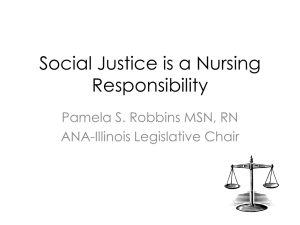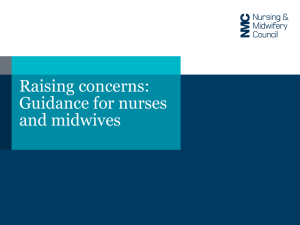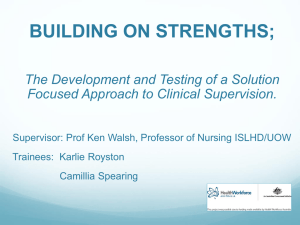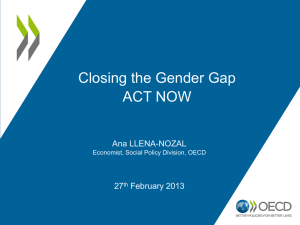Brief on OECD pilot data collection on HWF mobility
advertisement
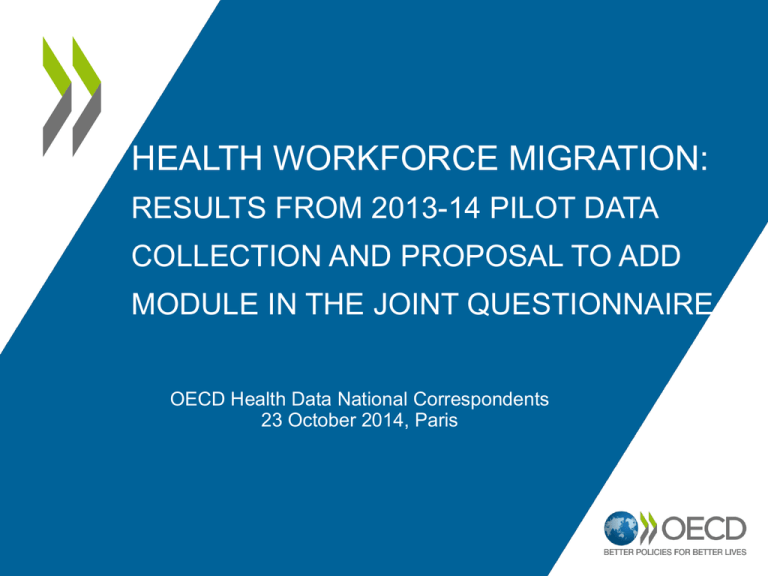
HEALTH WORKFORCE MIGRATION: RESULTS FROM 2013-14 PILOT DATA COLLECTION AND PROPOSAL TO ADD MODULE IN THE JOINT QUESTIONNAIRE OECD Health Data National Correspondents 23 October 2014, Paris OECD pilot data collection in 2013-14 • Aim: Begin to update data on international migration of foreign-trained doctors and nurses in OECD countries: – first reported in 2007 chapter in OECD International Migration Outlook – data collection pursued in OECD Health Data questionnaire up to 2009 • Part of broader OECD project, also including data collection on foreign-born doctors and nurses (based on the wave of national census around 2010/11) • Begin to analyse impact of a number of recent developments on migration trends (e.g., economic crisis in 2008-09, EU enlargement in 2004 and 2007, Global Code on the International Recruitment of Health Personnel in 2010) • Work done in collaboration with WHO-Headquarters Scope and approach to pilot data collection • Focus on doctors and nurses • Focus on place of training (foreign-trained, where first diploma was obtained) • Collect immigration data from destination countries by all countries of origin (based on professional registries, physician/nurse surveys, other sources) • Include both total “stock” and annual “flows” • Time series (from 2000 to 2012) Results of pilot data collection in terms of data availability • Doctors: – Stock: 25 countries (out of 29), including 20 with data by countries of origin – Flow: 19 countries (out of 29), including 16 with data by countries of origin • Nurses: – Stock: 23 countries (out of 29), including 16 with data by countries of origin – Flow: 16 countries (out of 29), including 13 with data by countries of origin Note: This pilot data collection was not carried out in Greece, Iceland, Luxembourg, Mexico and Turkey. Data sources for pilot data collection Doctors Australia Austria Belgium Australian Institute of Health and Welfare (AIHW) Austrian Medical Chamber Federal Public Service - Public Health, Database of health work professionals (INAMI - RIZIV) Canada Canadian Institute for Health Information, Scott’s Medical Database (SMDB) Chile Czech Republic Denmark Estonia Finland France Germany Hungary Ireland Israel Registro Nacional de Prestadores Individuales de Salud Czech Medical Chamber Statens Serum Institut, Population Register Health Board, Register of Health Professionals National Supervisory Authority for Welfare and Health, Central Register of Health Care Professionals Ordre des Médecins German Medical Association Office of Health Authorisation and Administrative Procedures, Operational Registry Irish Medical Council, Medical Council Annual Report Health Information Division, Ministry of Health, Physician License Registry Netherlands CIBG, Beroepen in de Gezondheidszorg (BIG) New Zealand Norway Poland Slovak Republic Slovenia Spain Sweden Switzerland United Kingdom United States Medical Council of New Zealand, Medical Register Norwegian Registration Authority for Health Personnel, the health personnel register Polish Supreme Chamber of Physicians and Dentists, Central Register of Physicians and Dentists National administrative register of healthcare professionals National Institute of Public Health Slovenia, National Healthcare Providers Database Regional Councils of Physicians, National Institute of Statistics National Board of Health and Welfare, NPS-register Fédération des médecins suisses (FMH) ISD Scotland, HSCIC and GMS Census (Wales) American Medical Association, Physician Master Files Data sources for pilot data collection Nurses Australia Belgium Canada Chile Denmark Estonia Finland National health Workforce dataset, Health Workforce Australia Federal Public Service - Public Health, Database of health work professionels, (INAMI - RIZIV) Canadian Institute for Health Information, Nursing Database Registro Nacional de Prestadores Individuales de Salud Statens Serum Institut, Population Register Health Board, Register of Health Professionals National Supervisory Authority for Welfare and Health, Central Register of Health Care Professionals France DRESS, Répertoire Adeli des professions de santé Federal Statistical Office in cooperation with the Federal Statistical Offices of the Länder, Statistics for the Federal Recognition Act (2012) Ireland Irish Nursing Board, An Board Altranais Israel Health Information Division, Ministry of Health, Nurse License Registry Italy Federazione nazionale dei Collegi Ipasvi Netherlands CIBG, Beroepen in de Gezondheidszorg (BIG) New Zealand Nursing Council of New Zealand, New Zealand Workforce Survey Data Norway Norwegian Registration Authority for Health Personnel, the health personnel register Poland Main Chamber of Nurses and Midwifes, Central Register of Nurses and Midwifes Portugal Ordem dos Enfermeiros, Gestão de Membros da Ordem dos Enfermeiros Slovenia National Institute of Public Health Slovenia, National Healthcare Providers Database Spain Regional Councils of Nurses, National Institute of Statistics Sweden National Board of Health and Welfare, NPS-register Switzerland FSO Swiss Federal Statistical Office, Administrative Hospital Statistics United Kingdom Nursing and Midwifery Council United States 2013 National Workforce Survey of Registered Nurses, National Council of State Boards of Nursing Germany Data comparability limitations and other issues • Same type of comparability limitations as for the broader data collection on the total number of doctors or nurses (e.g., data for some countries relate to “professionally active” or “all licensed to practice” rather than “practising”, many countries exclude physicians-in-training) • Some countries (e.g., Germany) are only able to report data based on “foreign nationality” (not foreign-trained) • Problem in distinguishing “foreign-born and foreigntrained” students from “domestic-born but foreigntrained” students returning to their home country (“internationalisation of medical and nursing education”) Proposal to add a new module in the 2015 Joint Questionnaire • Aim: Collect a relevant minimum dataset: – to fill current gap in OECD, Eurostat, WHO-Europe databases – to serve also as an input to national reporting under the WHO Global Code (requirement once every three years) • Approach: Follow same specifications as under the OECD pilot data collection, but with an additional specification to identify ‘domestic-born but foreign-trained’ doctors and nurses • Frequency: This new module may be included every year or every three years, depending on assessment of benefits of regular updating versus data collection burden Issues for discussion • COMMENT on the results from 2013-14 OECD pilot data collection on foreigntrained doctors and nurses • COMMENT on proposal to add a new module on health workforce migration in the 2015 Joint Questionnaire
